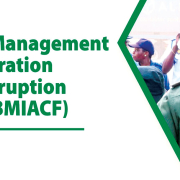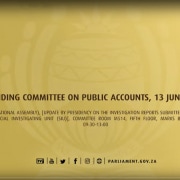|
Getting your Trinity Audio player ready...
|
Presidency was a no-show for a hearing of the parliamentary standing committee on public accounts (Scopa) on Tuesday, that was meant to receive feedback on the progress of high-profile corruption reports overseen by the country’s law enforcement agencies. This despite having been furnished with Special Investigating Unit (SIU) reports – among them the recently completed report on the Digital Vibes saga – several days ago.
Scopa chairperson Mkhuleko Hlengwa told the virtual hearing that he had received correspondence from the presidency asking to be excused from the meeting as the highly-anticipated report was still being studied. He said while it was important that the presidency satisfy itself on the work of applying its mind over the SIU reports, it was also important, and in the public interest, that such matters be prioritised.
“At this point in time they are not in a position to engage on the matter until the flow of information has been completed … it remains a matter that in one way or another is alive and they are still processing information, I suppose, and findings and additional things that are required on that matter.”
In a letter to Hlengwa, the SIU stated that a final report had been submitted to the presidency within the deadline of 30 June, but the unit was then sent back to include additional information, which then led to a second submission on 3 July.
The other agencies present, including the Directorate for Priority Crimes Investigations (DPCI), or Hawks, as well as the National Prosecuting Authority (NPA), went ahead with presentations prepared for the hearing.
Both NPA head Shamila Batohi and her Hawks counterpart Godfrey Lebeya decried the great impact that the Covid-19 pandemic has had on their institutions. Lebeya said some of their most important investigations have suffered delays because investigators overseeing them had been rendered incapacitated. There were also a substantial number of deaths across the provincial offices of the Hawks.
“This has been a challenge. Twenty-five percent of our members have been affected by Covid. As I speak the spouse of one of the generals participating here is in the ICU. We have also lost 10 of our members as a result of Covid,” Lebeya said at the start of his presentation.
Batohi noted the same, saying some of the NPA’s crucial work was impacted by Covid-19.
Capacity still not growing fast enough
Most worrying, however, was that the long-standing challenge of capacitation for either institution was not being resolved at the pace that she had hoped. Of particular concern for the NPA is its Assets Forfeiture Unit (AFU), which is under-staffed yet has potentially the most important task, that of recovering monies lost to corruption as promptly as possible.
“I think it’s important for the committee and for colleagues to understand that capacitation still remains a challenge. Inasmuch as there are many green shoots … there’s been some very good progress recently with regard to certain cases … there’s lots of good work happening, but we are still moving incrementally. If we want to move exponentially, we really need to look at the capacitation issue,” Batohi told the committee.
For Lebeya, the dearth of qualified forensic specialists meant that the DCPI has to knock on the doors of private consultancies, a model that is unsustainable. Asset forfeiture is also strained, said Batohi, with too few investigators.
“As the committee may not know, the NPA does not hire investigators. We’ve been able to hire investigators on contract,”Batohi said. “What we’ve identified as a challenge in the asset forfeiture space is the co-location of investigators from the DPCI together with our asset forfeiture professionals.
“Forensic capabilities still remain a challenge in law enforcement. We are looking to create a forensic capability within government, but this is also not going to be overnight.” The skills, she added, are difficult to obtain.
Lack of funding necessitates innovative approaches
The NPA’s new kid on the block, the Investigative Directorate (ID), has had to re-organise itself in order to meet targets, its head Advocate Hermione Cronje told Scopa. Instead of pursuing complex cases as a whole and therefore spending too much time and resources, the ID has decided to break them up into smaller, manageable cases with greater prospects of success.
The directorate has also borrowed from the Hawks’ staff resources, meaning that some of its work is not fulfilled by permanent staff.
For all their challenges, the agencies named the lack of funding as the source. Batohi made the point in her closing remarks that while the NPA sought to beef up its prosecutor complement in order to get it to a status of achieving its strategic goals, its current budget of R4.4-billion per annum means the authority may not be able to keep paying staff in a few years.
“We know that we are working in very fiscally constrained times, and we have to be efficient with less. But an investment in the NPA is an investment in the country, particularly in the AFU space, where an investment in asset recovery will give you a return in investment as we certainly hope we can bring back more money than is expended.”
The NPA’s acting chief financial officer Tebogo Sethabela gave an overview of its financial health over the next three years, reiterating Batohi’s fears that without the budget being enlarged, there would be no point in getting additional human resources now.
“The NPA can cover the compensation of employees for this current financial year, but for the outer years we are seeing a serious challenge because we continue recruiting required skills for the organisation,” Sethabela said.
Why SAA and not NPA?
This got some reaction from committee member Arnold Lees, who questioned the slow response from National Treasury to the challenges raised around funding, which he said were not new. If government could bail out a “defunct” South African Airways, why could it not help fund such important institutions?
“What is absolutely clear is that there is money available and it’s used for purposes which are far less important than this particular purpose … if we don’t get on top of this corruption and fraud which continues today in many areas, we are facing a dire future for the country.”
His sentiments were shared by Hlengwa, who made the point that National Treasury had promised to fill prosecutions vacancies, which will help speed up the processing of cases and the recovery of money lost to corruption. “We get the point that it takes money to recover money, but also timing and urgency in this regard is of equal importance so that you don’t have what I term cosmetic prosecutions.”








